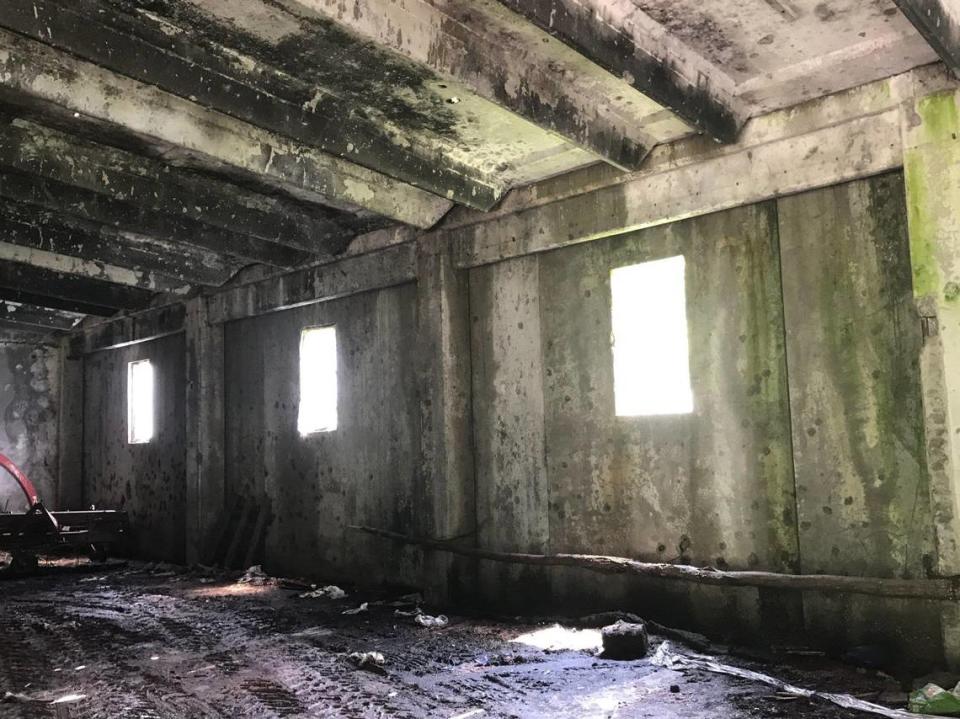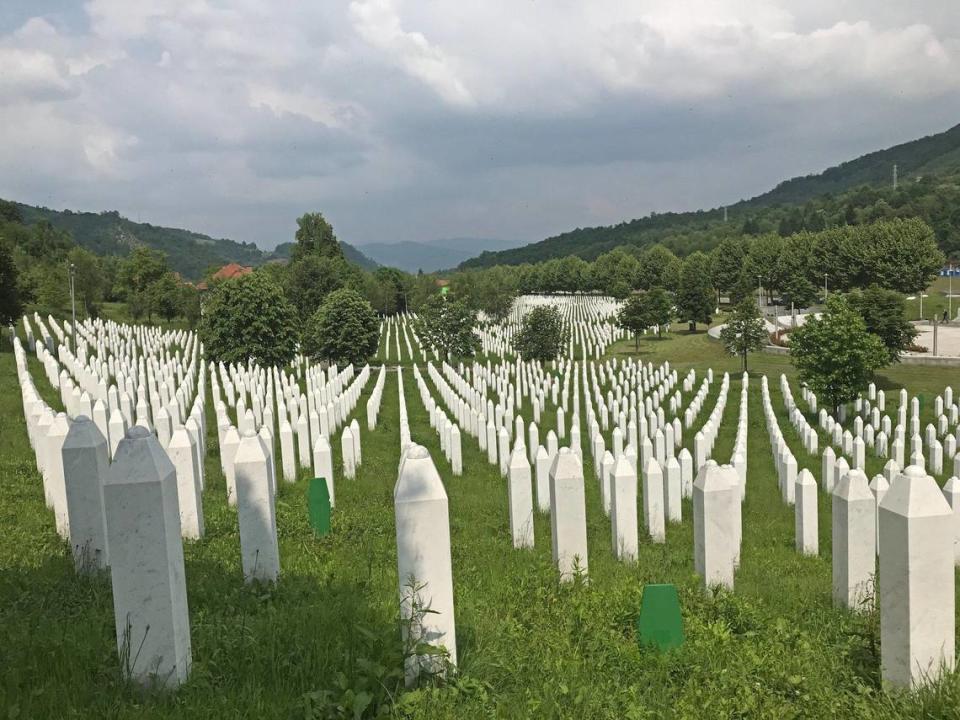These Bosnian refugees came to Charlotte 20 years ago. Why doesn’t it feel like home?
When Almedina Suljicic Ijaz had her son a year ago, sadness almost overcame her joy.
In that moment, she couldn’t help but think of the mothers in Srebrenica, a small town in Ijaz’s home country of Bosnia in eastern Europe. In 1995, 8,000 people, mostly men and young boys, were killed there in just a few days.
And as she was holding her own son, she felt a mixture of anger and grief, realizing she couldn’t even imagine the suffering those mothers endured.
“My heroes are those women who cry on the graves of their sons yearly, every day I’m sure for some of them,” she said. “What do you have to look forward to if you don’t have your children?”
She looks away, and her eyes tear up. The Srebrenica massacre was 24 years ago, but it’s still not easy to talk about.
She loved Bosnia, but like so many others, she had to leave due to the lack of opportunity. She and other Bosnian refugees have tried to reconcile these memories while making Charlotte their home, and now that Bosnia seems to be regressing to an all-too-familiar situation, they wonder if they have a home anywhere.
Coming to North Carolina
Refugee resettlement is mostly random, according to the Carolinas Refugee Resettlement Agency. If a refugee already has a family member in the United States, they typically reunite with them. Some Bosnians came to the U.S. before the war started and helped communities grow where they lived.
That’s the case with Mirsad Hadzikadic, who immigrated in the 1980s to attend college. He joined the faculty at UNC Charlotte, and as the war was starting, he helped refugees resettle here.
Most Bosnian refugees who settled in the U.S. went to St. Louis and larger cities like New York City and Chicago. Many of those who came to the South, however, ended up in North Carolina, which is now home to over 10,000 Bosnians, according to a 2017 proclamation from Gov. Roy Cooper.
Ijaz, now 28, had family in Charlotte, which she said made it easier for her family to move here in 2001.
She was young when the war started in 1992 and her memories are hazy. But she does recall a lot of sadness. Her family had to live in an abandoned house with bullet holes through the walls.

Bosnian families like Ijaz’s came to Charlotte hoping for better opportunities after tensions over independence for the multi-ethnic country eventually culminated in an ethnic cleansing regime perpetrated by Serb forces onto the Bosnian Muslim population. It lasted three years and killed an estimated 100,000 people and displaced another 2 million.
After the war ended, economic and political conditions in the country barely improved. The end of the war brought little to no government reform, and youth unemployment has remained so high that hundreds of thousands of people leave each year.
Holding on to culture
Immigrants, especially refugees, often struggle holding on to their culture once they come to the United States, said John Cox, director of UNC Charlotte’s Center for Holocaust, Genocide and Human Rights. He’s adding a chapter about Bosnia to his 2017 book about genocides in the 20th century.
“They can have an exaggerated sense of, we have to be 100% American if we’re going to make it here,” he said.
This is something the Bosnians interviewed for this story remember well. Despite this, they said they have tried to make Charlotte their home while keeping aspects of their Bosnian culture.
For many, it’s hard to stay connected, both to others in the community and to the culture, without going back to visit often. So to help with that, the first families to move created a Bosnian mosque and cultural center in east Charlotte, which gave them a space to organize events like the yearly Srebrenica commemoration on July 11.

Mensur Medic is the mosque’s treasurer, and he said it gives the community something to hold onto.
“The secular part of your identity fades quicker,” he said, which is why he thinks the mosque has lasted so long while other activities like dance teams or language classes tend to fade.
Ijaz said the mosque is a reminder of warm memories from growing up.
“It’s where my people went through so much to fight to have our say, and it’s where my ancestors are,” she said.
But it can be bittersweet at times. Though they have lived in Charlotte for years, many of these Bosnians still feel like they have one foot in both cultures. When they speak English, they have an accent, but they have an accent when they speak Bosnian too because they’ve lived in the United States for so long.
Dino Crnalic immigrated to North Carolina to be with family after the war. He eventually came to Charlotte after graduating college, but he said it’s hard to call it home. He was about to turn 9 years old before they left his Bosnian hometown, and his parents had to cancel his party.
“And I remember being upset about that,” he said. “As a child, you don’t understand why there are people dying for no reason around you, being killed for no reason. You’re worried about a birthday party.”
He didn’t leave Bosnia because he wanted to; he left to survive.
He said there’s one thing that keeps Bosnians together on a spiritual level, and that’s what he calls their core — something that regardless of what you have in common, you understand each other at the most basic level.
“No matter what, if we spend an hour together, or if we’re spending 10 hours together, we always end up talking about the war,” he said. “It will never go away.”
Passing it down
One of the biggest struggles is the powerlessness some feel when they think about what’s happening in their home country, especially because many of them would like to return if conditions improve.
During the war, Hadzikadic remembers being glued to the television, and he is just as concerned today.
He and other Bosnians feel that the government is regressing with the rise of nationalist politicians in the region as wounds from the war are still healing. As time goes on, he said it’s getting harder for those who moved to stay engaged, but he and other Bosnians don’t want to give up — many want to stay organized and to pass the culture down.
“If a person is only for himself, it’s not a good life,” Hadzikadic said. “You have to be part of something larger than yourself.”
Cox, the UNCC professor, wants more people to know what brought Bosnians to cities like Charlotte.
“It’s important for people to know it was a genocide because there was so much deliberate confusion at the time that people don’t understand that,” he said. “And you still see the United States and Europe today being just as indifferent when forces that carried out the genocide are still strong.”
Even with the country’s problems, Ijaz wishes people knew how beautiful Bosnia is and how the people still manage to smile. She doesn’t hesitate for even a second when she promises her son will know everything one day.
“I just think that you need to take lessons and take what your family went through and pass it on to the next generation so that they’re aware and history doesn’t repeat itself,” she said.

